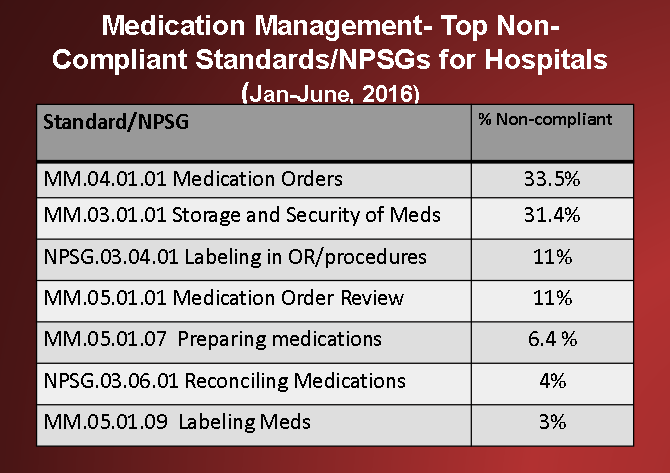
Earlier this month, the nation’s top pharmacists gathered at the ASHP summer meeting. The Joint Commission provided a medication management update for 2017 which highlighted key issues that pharmacists are encountering. The top four non-compliant standards for hospitals were as follows:
- Medication errors
- Storage and security of medications
- Labeling OR/procedures
- Medication order review

Medication orders and the storage and security of medications showed up to be the top two compliance issues. These areas proved to be significantly greater challenges than the other areas identified, such as labeling in OR/procedures, medication order review, preparing medications, reconciling medications, and labeling medications.
Medication Storage and Security
Medication storage can be difficult when it comes to storing high risk medications, biologics, and controlled substances. The hospital bears great responsibility when it comes to securing medications and ensuring that unauthorized individuals are not able to obtain access to controlled substances and other drugs commonly diverted. All medications and biologics must be stored in secure areas to prevent diversion and these areas should be locked in accordance with law and regulation.
On The Joint Commission pharmacy survey, hospitals expressed challenges around failure to address diversion. A thorough investigation of a facility's drug diversion policy, aimed at protecting patients and identifying diverters among clinical staff, can reveal gaps and opportunities to prevent diversion.
Random audits and reports generated using automated dispensing cabinet (ADC) software allows monitoring of behavioral trends and withdrawals. Reviewing these reports can reveal relevant user information and identify points of potential drug diversion. Using these reports, clinical leaders are able to identify at-risk individuals early on. This not only prevents potential drug diversion, but also reduces the risk of a patient being affected by an individual's drug diversion practices. All of this is done with the goal of keeping patients safe and helping diverters address their issues without damaging their professional careers.
The hospital has the responsibility to prevent unauthorized individuals from obtaining medications in accordance with law and regulation. According to the survey, it is often difficult to managing who currently has access to which specific medications. Removing access to the automated dispensing cabinets has also proved to be a challenge. Additional findings of the survey included the following:
- Properly dating open injectables (SDVs vs MDVs; “date opened vs date expired”)
- Storing medications in patient care areas (including automated dispensing cabinets) in MDVs if single dose dosage forms exist
- Medications left unattended or in areas not considered to be secure
- Operating rooms not in use, but with unlocked medications, after hours
With time and resources dedicated to the storage and handling of medications, facilities can keep patients and clinicians safe from the dangers of diversion. To learn more about safely securing refrigerated controlled substances, view our article by following the link below.




